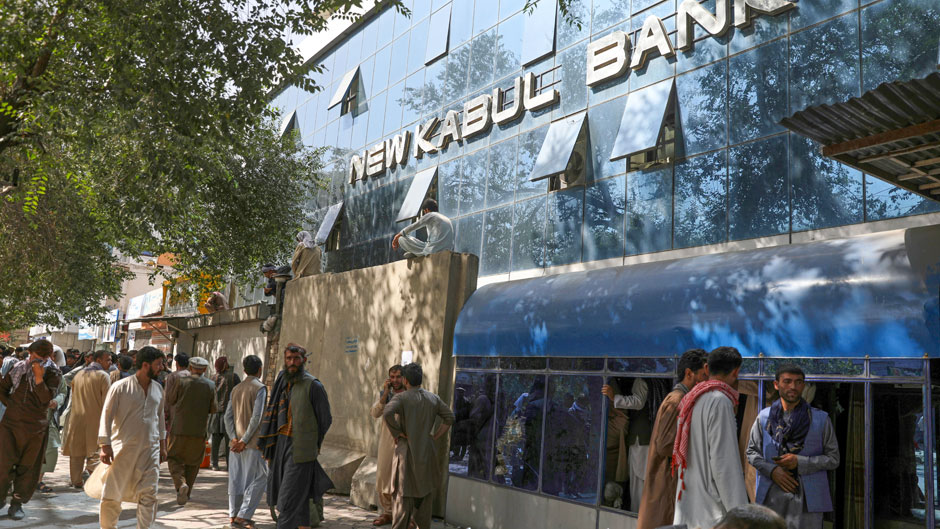With the final seconds ticking down on the massive evacuation and withdrawal from Afghanistan, some reports have suggested that the United States might exert its influence to deny the Taliban access to billions of dollars in gold and currency held in the New York Federal Reserve Bank and to millions in funding apportioned to Afghanistan through international lending organizations.
Caroline Bradley, law professor, Dean’s Distinguished Scholar, and associate dean for international and graduate programs at the University of Miami School of Law, and Michael Connolly, an international trade and finance specialist with the Miami Herbert Business School, explored the complicated questions regarding the possibilities.
Because multiple issues are at play, Bradley emphasized the importance of addressing them separately.
“First, for assets belonging to the state of Afghanistan there is a question about who is entitled to claim and exercise authority over these assets,” said Bradley, noting that the question will be determined through litigation examining principles of international law and that the proceedings will take place wherever the assets are held.
Bradley likened the scenario to that of Venezuela that has generated litigation in both the U.S. and England. Both the Maduro government and the Guaidó-led opposition have asked the Bank of England to recognize their rights over gold deposits held in the bank. While the UK has recognized the Guaidó government as the legitimate authority, the case remains unresolved based on an interpretation of recognition.
In a case in the U.S. involving rights to appoint members to the PDVSA Board Petroleos de Venezuela, the national petroleum company, the Delaware courts took a similar approach, basing the decision on the U.S. government’s recognition of the Guaidó government.
“The U.S. government therefore can affect how courts in the U.S. would assess claims to assets of Afghanistan through decisions as to whether to recognize the government of the Taliban,” Bradley said. She added that the situation remains complicated and might hinge on whether the Taliban establishes effective control over the territory, a questionable scenario based on the bombings last week.
In terms of recognition, Connolly noted that China has shown clear signs that it will recognize the Taliban government.
“There are lot of resources in Afghanistan—mining, natural gas, other raw materials—that China wants,” Connolly said. “They’re [the Taliban] going to get a ton of money from China for access to their raw materials.”
Yet at least in the short- to mid-term, the new regime, he pointed out, will be under “considerable stress” because of the lack of cash in the economy in Afghanistan, among the poorest nations in the world.
“It looks like there will be a liquidity crisis due to the central bank not having reserves to make available to the banks, which themselves, have practically no reserves,” Connolly said. “The distress may be so great that the U.S. might indeed have some leverage over the Taliban.”
In regard to the estimated $440 million pertaining to Afghanistan through the International Monetary Fund (IMF), Connolly explained that these monies were generated through a recent IMF initiative geared to support emerging nations in the battle to manage the COVID-19 pandemic. The U.S. agreed to provide $60 billion, and Connolly noted that because the amount did not reach a certain threshold, congressional approval was not required.
Other monies, through existing international grants, pertain to Afghanistan through the World Bank, yet both the IMF on Aug. 17 and the World Bank on Aug. 25 blocked funding to the Taliban.
Bradley highlighted that the same issue of recognition will determine the Taliban's ability to access these funds.
“Although here the issue plays out differently because rather than a domestic court making a determination based on recognition by its own government, international organizations will assess the state of recognition within the international community,” Bradley said. “This is a much more complex assessment.”
Yet to that point, Connolly emphasized the strong U.S. influence in the IMF, based in large part over the fact that the U.S. provides more than 20 percent of the organization’s funding and holds the largest voting quota.
“It’s just not going to happen, at least in the short run” he said, speaking to the possibility that the organization would go against U.S. interests to continue to restrict funding.
Additionally, Bradley noted that even if the Taliban were to be recognized as the government of Afghanistan, loans from international financial institutions depend on an assessment of what the government is doing or will do with the loaned money.
In reference to the estimated $9 billion pertaining to Afghanistan that is held in the New York Federal Reserve Bank, Connolly explained that the idea of safeguarding a combination of currency and gold deposits in the U.S. banking system dates back to the 1930s with the onset of the German offensives that led to World War II.
“There is a long history of this common practice among nations all over the world to hold their reserves within the stable and secure U.S. banking system,” Connolly explained. He noted that the monies are held there free of charge and highlighted the immense security surrounding the protection of access to the monies.
The same question of recognition governs access to these deposits, he said.
“So long as the Taliban don’t have signature authority, the Federal Reserve could not and would not send any monies to them—they’re effectively frozen,” he said, while referencing funds pertaining to Iran in recent years that were frozen for over a year and only unfrozen when the Obama administration recognized that certain conditions had been satisfied.
These same conditions could be “tranched”—which implies sequenced disbursements conditioned on satisfied demands, he said.
“So, the U.S. may have more leverage as the economic crisis unfolds,” said Connolly, noting that for now the Taliban are sticking to the Aug. 31 evacuation deadline.

